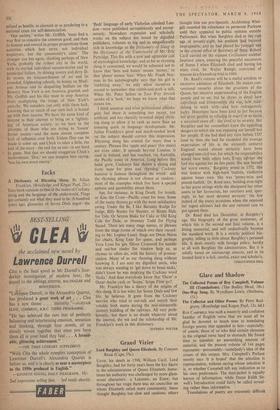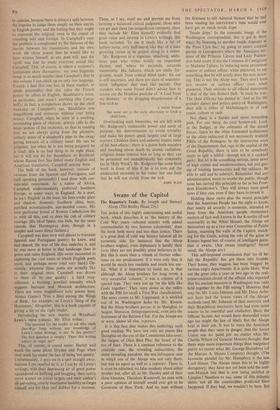Glare and Shadow
The Collected Poems of Roy Campbell, Volume 15s.) The Collector and Other Poems. By Peter Red- grove. (Routledge and Kegan Paul, 12s. 6d.)
ROY CAMPBELL was such a masterly and confident handler of English verse that we must all be glad he devoted so much time to translating foreign poems that appealed to him—especially, of course, those of us who find certain elements in his original verse hard to stomach. He found time to translate an astonishing amount of material, and the present volume of 144 pages represents—presumably—somebody's idea of the cream of this output. Mrs. Campbell's Preface merely says 'it is hoped' that the selection is representative, without saying whose selection it is, or whether Campbell left any indication as to his own preferences. The dust-jacket is equally barren of information, while Dame Edith Sit- well's Introduction could fairly be called reveal- ing rather than informative.
Translations of poetry are extremely difficult
to criticise, because there is always a split between the impulse to judge them simply on their merits as English poems, and the feeling that they ought to represent the original, even to the extent of sounding odd and foreign. In Campbell's case the problem is complicated by the thinness of the barrier between his translations and his own work. He chose poems that he would like to have written himself, as any poet will, and the result was that he made everyone sound like Campbell. This, of course, is where a reviewer's limitations show themselves : my own linguistic range is so much smaller than Campbell's that in this.volume I can check up on only one language, French. I find (for one has, in these matters, to speak personally) that this ruins the French poetry he offers in English; Baudelaire's verse, in particular, just wasn't anything like Camp- bell's; in fact, a comparison shows up the chief Weakness of Campbell's ear. Baudelaire was magnificent and sonorous without ever being brassy; Campbell, when he aims at a swelling, resounding piece of rhetoric, always calls in the brass section of the orchestra, so that in reading him we are always going from the plaintive, solitary notes of a shepherd's pipe to the swag- gering bravura of a military band. He can be poignant, but when he is not being poignant he is loud; this is no bad thing in its right place, but it will not do for Baudelaire or Rimbaud, whose Bateau lyre has defied many English and American translators, Campbell among them.
The bulk of the book, however, consists of versions from the Spanish and Portuguese, and (still speaking personally) I read these with con- siderable enjoyment. As a native of Africa, Campbell understandably preferred Southern Europe, in many ways, to England. As a poet, he isn't 'English' in the least; his lines evoke glare and shadow, dramatic Southern cities, bare, parched mountainsides, sun-dazzled coasts. His own particular brand of Roman Catholicism fits in with all this, and so does his cult of solitary courage. (He liked Spain, one feels, for the same reasons that Hemingway does, though in a simpler and more direct fashion.) Campbell was thus very well placed to translate Spanish and Portuguese poetry; he knew, and had shared, the way of life that underlay it, and he was more at home in that landscape than in green and rainy England. (He never succeeded in capturing the cool tones at which English poets excel, and perhaps never tried very hard.) Ob- viously, whatever these poets are actually like in their original texts, Campbell was drawn to them all by one quality : a hard mag- nificence, a burning, jewelled intensity which suggests baroque and Moorish architecture. There are some magnificent lyric poems here; Alonso Gamo's 'You a Bird among the Wings of Birds,' for example, or Lorca's 'Song of the Horseman.' Altogether, this is a book capable of giving a lot to the right reader.
Introducing the new reprint of Wyndham Lewis's verse polemic, Mr. Eliot writes:
The question for the reader to ask who reads One-Way Song without any knowledge of Lewis's other writings, is not 'Is this poetry?' The first question is simply: 'Does this writing attract or repel me't' This, of course, is sound sense; Hazlitt said much the same about Dryden and Pope when their work lay under the ban of being 'not poetry.' Unfortunately, it puts me in a spot straight away, because I am repelled by it, as 1 am by all Lewis's writings, with their depressing air of great power squandered on bullying and bragging, their satiric verve wasted on trivial targets and their author's all-pervading, utterly wearisome inability to forget himself and his likes and dislikes for a moment.
These, as I say, repel me and prevent me from forming a balanced critical judgment; those who can get past them (no insignificant company, since they include Mr. Eliot himself) evidently find great value and interest in Lewis's writings, this book included. To me it reads like a lot of hollow noise, only half-heard, like that of a man growling curses as he gropes along in a sewer.
Mr. Redgrove is a vigorous, attacking, ambi- tious poet who writes boldly on important themes, and, where he succeeds, succeeds memorably. His failures, which are easily for- givable, result from critical blind spots; his ear is still uncertain, and there are slabs of unassimi- lated 'influences' that read like parody. One wonders why some friend didn't advise him to screen out the Hopkins pastiche of 'A Leaf from my Bestiary,' or the .dragging shapelessness of a line such as a music lesson She went out in the early afternoon to fetch a child from.
Overlooking such blemishes, we are left with Mr. Redgrove's undeniable power and sense of purpose, his determination to avoid triviality and make his poetry speak largely and of large matters. Children (born and unborn) inspire some of his best effects: there is a poem both macabre and touching about death by atomic radiation; religious issues interest him so long as they can be presented not metaphysically but concretely (as in 'Holy Week'). Mr. Redgrove has some hard work in front of him if he is to iron out the amateurish elements in his verse; but one feels that he will not shrink from the task.
JOHN WAIN



































 Previous page
Previous page